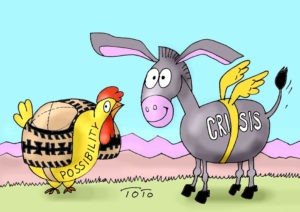
By Edmond Y. Azadian
Armenians in the homeland and around the world were finally able to let out a sigh of relief at the conclusion of the two-week standoff at the police station in Erebuni District of Yerevan, where a group of 31 gunmen had occupied the police station and held the police hostage. Their original demands were the resignation of the president and the release from jail of Jirair Sefilian, a Karabagh War hero and the head of the Founding Parliament, a fringe militant group, who had been arrested in June on charges of plotting to overthrow the government through armed revolt.
After the release of the hostages earlier, the gunmen surrendered on July 31, averting further bloodshed. The action had already taken two lives among law enforcement authorities, Yuri Tepanyan and Arthur Vanoyan.
Armenia’s National Security Service announced that 47 people have been taken into custody in connection with the assault on the police station.
One of the leaders of the group, Varoujan Avedissyan, announced online, before his surrender, that “our task is fulfilled. The popular protest will continue. We feel that our victory is close and I call on the Armenian people to continue the fight.”







